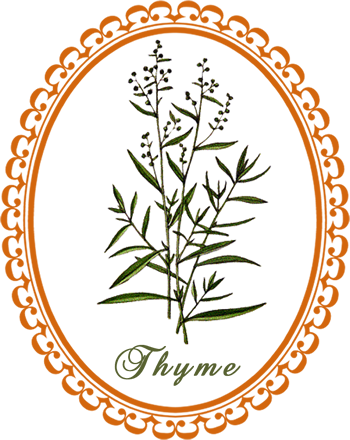
Thyme: the main active ingredient of this herb's essential oil is thymol, which is often used as a hospital antiseptic and in mouthwashes. Thyme is eight times more powerful when taken as a "whole herb", which enables all its constituents to work in synergy...
Common Names: Thyme, Common thyme, Garden thyme
Botanical Name: Thymus vulgaris
Family: Lamiaceae
Plant Type: Perennial Herb
Parts Used: Leaves and shoots
Flowering: July
Native to the Mediterranean region, thyme is grown in herb gardens and cultivated commercially in most temperate regions of the world.
Description: Thyme is a low-growing perennial herb with thin, branching stems and small grayish green leaves. Tiny white or purple flowers are arranged in dense whorls on terminal spikes.
Cultivation: Thyme grows best under hot, dry conditions in full sun and well-drained, slightly stony soil with a pH of 6.3. It likes sun but will tolerate partial shade.
Harvesting: Pick leaves or sprigs any time to use fresh. Harvest for drying in late summer, just before the flowers open. Dry quickly, and strip the leaves and flowers off the stems before storing them.
Culinary Uses: Thyme is one of the essential ingredients of bouquet garni. Thyme is added to soups and stuffings, salads and sauces, sausages and stocks, and it complements nearly every kind of meat, fish, fowl and vegetable dish. It works well in just about every kind of cooking.
Thyme Magick
Health. Healing. Sleep. Psychic Powers. Love. Purification. Courage.
Wear thyme to help you see fairies.
Burn as incense or wear to attract good health.
Place a sprig beneath your pillow to ensure a restful sleep and a lack of nightmares.
Burned before a magical ritual to cleanse the area and wear thyme to help develop your psychic powers.
Herbal Healing with Thyme
Cosmetic Uses: Use thyme for a stimulating and antiseptic herbal lotion.
Medicinal Actions: Analgesic, anthelmintic, antibacterial, antidepressant, antifungal, anti-inflammatory, antioxidant, antipruritic, antiputrid, antirheumatic, antiseptic (strong), antispasmodic, antitoxic, antitussive, antivenomous, antiviral, aperitif, aphrodisiac, astringent, balsamic, bronchodilator, cardiac, carminative, cicatrizant, counterirritant, cytophylactic, diaphoretic, digestive, diuretic, emmenagogue, expectorant, hypertensor, insecticide, nervine, parasiticide, pectoral, rubefacient, sedative, stimulant, stomachic, sudorific, tonic, uplifting, vermifuge, warming
Medicinal Uses: Thyme is an excellent cough remedy, deterring infections, soothing spasms, and promoting the flow of mucus. It is the herb of choice when treating bronchitis and pneumonia, asthma, whooping cough, and any inflammation of the throat and nasal passages. Thyme can be combined with herbs such as licorice (Glycyrrhiza), angelica (Angelica), and elecampane (Inula) and used as a mouthwash or gargle, taken as a tea or tincture, applied externally as an ointment, or the essential oil can be inhaled.
The strong antiseptic action of Thyme is useful in the treatment of infections, whether bacterial, viral or fungal. To help cleanse the digestive system after a stomach bug or parasitic infection, take thyme with German chamomile (Matricaria), comfrey (Symphytum), or mugwort (Artemisia vulgare). Thyme tea is useful for indigestion and colic. Use externally to treat shingles and rheumatism.
Body Care with Thyme
- To treat a persistent cough and respiratory congestion, take 1 cup thyme infusion up to three times daily until the condition has improved.
- To relieve bad breath or gum disease, take 1 teaspoon thyme tincture in a little water or juice three times daily.
Infusion: 1 teaspoon dried or 2 teaspoons fresh thyme sprigs in 1 cup just-boiled water.
Tincture: 200 g (7 oz) dried or 400 g (14 oz) fresh thyme leaves or sprigs in 1 litre (4 cups) vodka-water mix.
Source: The Essential Herbs Handbook by Lesley Bremness
If you appreciate the information provided,
please help keep this website running. Blessings!
© 2008-2025 aromaworx.ca. All rights reserved.

